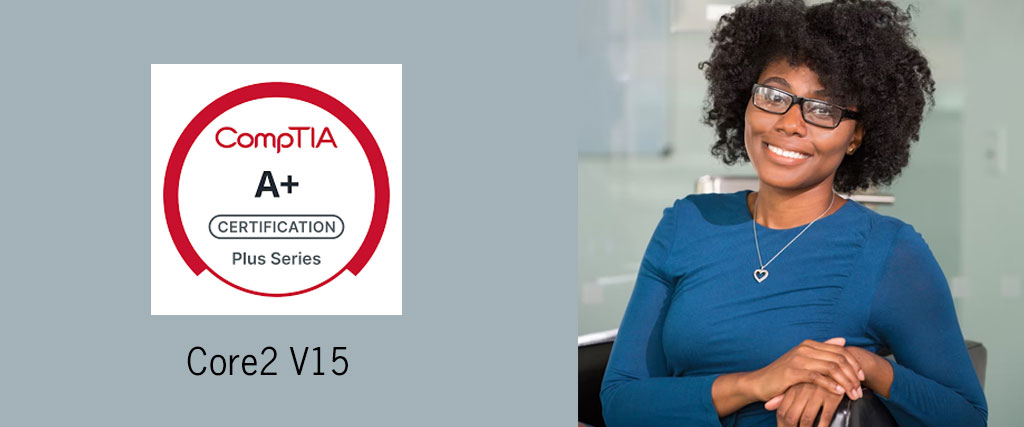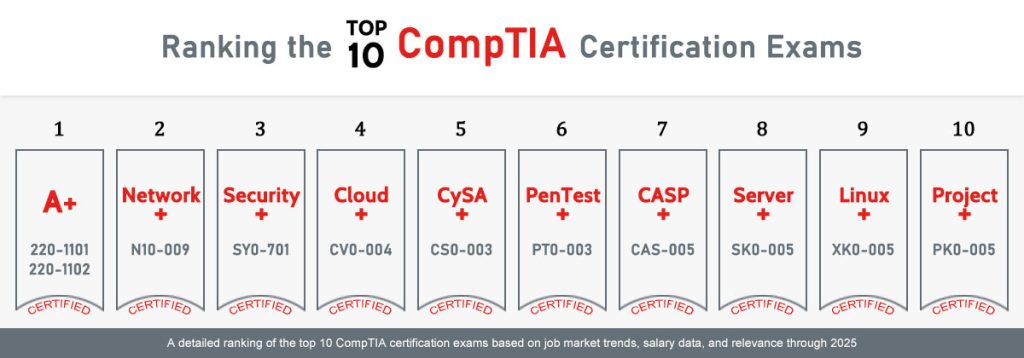
If you’re starting your IT career in 2025, the CompTIA A+ 220-1202 (Core 2 V15) certification is your best foundation. It’s globally recognized as the entry-level standard for IT professionals, proving your ability to troubleshoot, secure, and manage diverse operating systems — from Windows to Linux to mobile OS.
Whether you’re aiming to become a Help Desk Technician, IT Support Specialist, or Field Engineer, this certification opens real-world opportunities in both enterprise and remote tech support environments.
How many exams for A+ certification?
To earn the CompTIA A+ certification, candidates must pass two exams: 220-1201 (Core 1) and 220-1202 (Core 2).
Core 1 focuses on hardware, networking, and mobile device fundamentals, while Core 2 emphasizes operating systems, security, software troubleshooting, and operational procedures.
You must pass both exams to become officially A+ certified.
This dual-exam structure ensures you gain not only theoretical knowledge but also the practical, cross-platform skills needed in real-world IT environments.
Understanding the CompTIA A+ 220-1202 Exam Structure
Exam Overview
- Exam code: 220-1202 (Core 2 V15)
- Version released: 2025
- Question types: Multiple-choice and performance-based (PBQs)
- Duration: 90 minutes
- Passing score: 700 out of 900
- Languages available: English, Japanese, Portuguese, Spanish, Thai, and more.
Exam Domain Breakdown
Based on the official CompTIA 220-1202 objectives:
| Domain | Percentage | Key Focus |
|---|---|---|
| Operating Systems | 28% | Installation, file systems, Windows tools, OS upgrades |
| Security | 28% | Encryption, access control, malware prevention, wireless protocols |
| Software Troubleshooting | 23% | Diagnosing OS and app issues, mobile troubleshooting, security fixes |
| Operational Procedures | 21% | Documentation, safety, communication, backup & recovery |
Why CompTIA A+ Is Worth Your Time
In 2025, CompTIA A+ remains the most in-demand certification for IT support. Employers still treat it as a baseline qualification for entry-level tech roles.
According to the 2025 CompTIA Workforce Study, certified professionals earn 15–25% more and have a 40% higher promotion rate in the first year.
Compared with Microsoft Certified: Fundamentals or Cisco CCST, the A+ covers a broader range of practical IT troubleshooting and operating system management — perfect for those entering IT without a degree.
What’s Covered in the A+ 220-1202 Exam
Operating Systems (28%)
Learn to install, configure, and maintain Windows, macOS, Linux, and mobile OS.
You’ll master file system structures, OS upgrades, and built-in tools such as Task Manager, Command Prompt, and Disk Management.
👉 Pro Tip: Practice building virtual labs using VMware or VirtualBox to simulate installations.
Security (28%)
Security knowledge is more critical than ever. You’ll study:
- Encryption methods (BitLocker, EFS)
- Access controls (permissions, authentication)
- Wireless security protocols (WPA3, VPN)
- Malware prevention (antivirus, firewalls, secure browsing)
In today’s hybrid work environments, these skills are directly applicable to remote IT support.
Software Troubleshooting (23%)
You’ll be tested on diagnosing problems with:
- Operating systems – boot errors, driver issues
- Mobile devices – connectivity or performance failures
- Security issues – malware, unauthorized access
Candidates often underestimate this section. But PBQs frequently simulate real helpdesk scenarios where timing and logical flow matter.
Operational Procedures (21%)
This domain focuses on soft skills and professional best practices:
- Documentation standards
- Communication and safety protocols
- Backup and disaster recovery
These are essential for long-term career success and client satisfaction — not just exam points.
10 Key Tips to Pass CompTIA A+ 220-1202 on Your First Try
1. Start with the Official Exam Objectives
Download CompTIA’s free Core 2 V15 objectives. Read them line by line — they define every question type and expected knowledge scope.
2. Use Verified Study Materials
Begin with CompTIA CertMaster Learn and supplement it with trusted third-party platforms like Leads4Pass 220-1202 (https://www.leads4pass.com/220-1202.html).
These resources align with the latest 2025 version, providing updated dumps and PBQs.
3. Set Up Your Own Virtual Lab
Hands-on practice beats memorization.
Use virtual machines to install and troubleshoot different operating systems. Create scenarios that mimic real support tickets — for example, fixing boot loops or corrupted user profiles.
4. Practice with Performance-Based Questions
CompTIA increasingly emphasizes PBQs — interactive simulations where you must apply knowledge, not just recall it.
Sites like Leads4Pass include realistic PBQs modeled after the 2025 format.
5. Plan a Study Schedule
A structured plan increases your pass probability. Example:
- Weeks 1–2: Operating Systems basics
- Weeks 3–4: Security deep dive
- Weeks 5–6: Software troubleshooting labs
- Weeks 7–8: Practice exams & revision
Study 1–2 hours per day instead of cramming the night before.
6. Join Online Study Groups
Communities like Reddit’s r/CompTIA, Discord servers, and LinkedIn study groups help you learn from others’ experiences.
Real candidates share test feedback and quick revision notes.
7. Track Your Weaknesses
After every mock test, analyze your weakest domain.
For example, if you keep missing malware prevention or Linux commands, focus exclusively there for a week.
8. Learn with Real IT Scenarios
Work on small projects — fix your home network, reinstall OS, or manage updates for friends.
Employers value hands-on exposure even before you’re certified.
9. Use Quality Practice Tests
Use platforms with updated question banks.
Leads4Pass 220-1202 Practice Tests include verified and regularly refreshed questions aligned with official objectives.
These practice sets simulate real exam pressure and time management.
10. Prepare Mentally for Exam Day
Sleep well the night before. During the test:
- Don’t spend more than 90 seconds on one question.
- Mark difficult ones and return later.
- Double-check performance-based questions last.
Confidence is your greatest tool on exam day.
How Hard Is the CompTIA A+ 220-1202 Exam?
The 220-1202 is moderately difficult, especially due to its PBQs.
Candidates with structured study plans and practice exams report 90–95% first-time pass rates.
How Long Should You Study?
For beginners: 10–12 weeks.
For IT professionals with prior experience: 5–6 weeks.
Follow a consistent schedule with milestone tracking (modules completed, mock scores).
Real-World Benefits of Earning CompTIA A+
After certification, you can work as:
- Help Desk Technician
- Desktop Support Analyst
- IT Field Engineer
Average U.S. salary in 2025: $58,000–$65,000 annually, with higher rates in cybersecurity-adjacent roles.
Is CompTIA A+ Still Worth It in 2025?
Absolutely.
The demand for skilled IT support specialists continues to rise with remote and hybrid work models.
A+ remains a prerequisite for advanced CompTIA paths like Network+, Security+, or CySA+.
Common Myths About A+
Myth 1: “A+ is too basic.”
→ False. It covers advanced OS and security topics, including Linux permissions and mobile integration.
Myth 2: “You need a degree.”
→ Many tech professionals start with A+ and move directly into IT support roles.
Myth 3: “It’s outdated.”
→ The Core 2 V15 update ensures relevance for modern IT infrastructures.
Exam-Day Strategy Checklist
- ✅ Arrive 30 minutes early
- ✅ Review key commands (
ipconfig,ping,chkdsk) - ✅ Read PBQs carefully before answering
- ✅ Double-check all flagged questions
Conclusion — Your Road to IT Success Starts Here
Passing the CompTIA A+ 220-1202 exam is more than just earning a badge — it’s proof that you can troubleshoot, secure, and manage today’s complex IT systems.
If you prepare smartly with structured study, community support, and resources like Leads4Pass 220-1202, you can confidently pass on your first try and step into your IT career with momentum.
FAQs
1. What’s new in CompTIA A+ 220-1202 compared to 220-1102?
It now includes macOS, Linux, and mobile OS, plus updated wireless and encryption protocols.
2. How long should I study before taking the exam?
Plan 8–12 weeks depending on your experience and available time.
3. What jobs can I get with A+?
Help Desk Technician, Support Specialist, Field Engineer, and IT Analyst.
4. What is the best practice test for A+ 220-1202?
Leads4Pass 220-1202 Practice Exams for updated and verified questions.
5. Is A+ still worth it in 2025?
Yes — it’s the foundation for most IT certifications and an entry point into stable tech careers.
6.How many exams do I need to pass to get CompTIA A+ certified?
You must pass two exams — 220-1201 (Core 1) and 220-1202 (Core 2). Core 1 covers hardware and networking basics, while Core 2 focuses on operating systems, security, and troubleshooting. Once both exams are passed, you’ll officially earn your CompTIA A+ certification.

